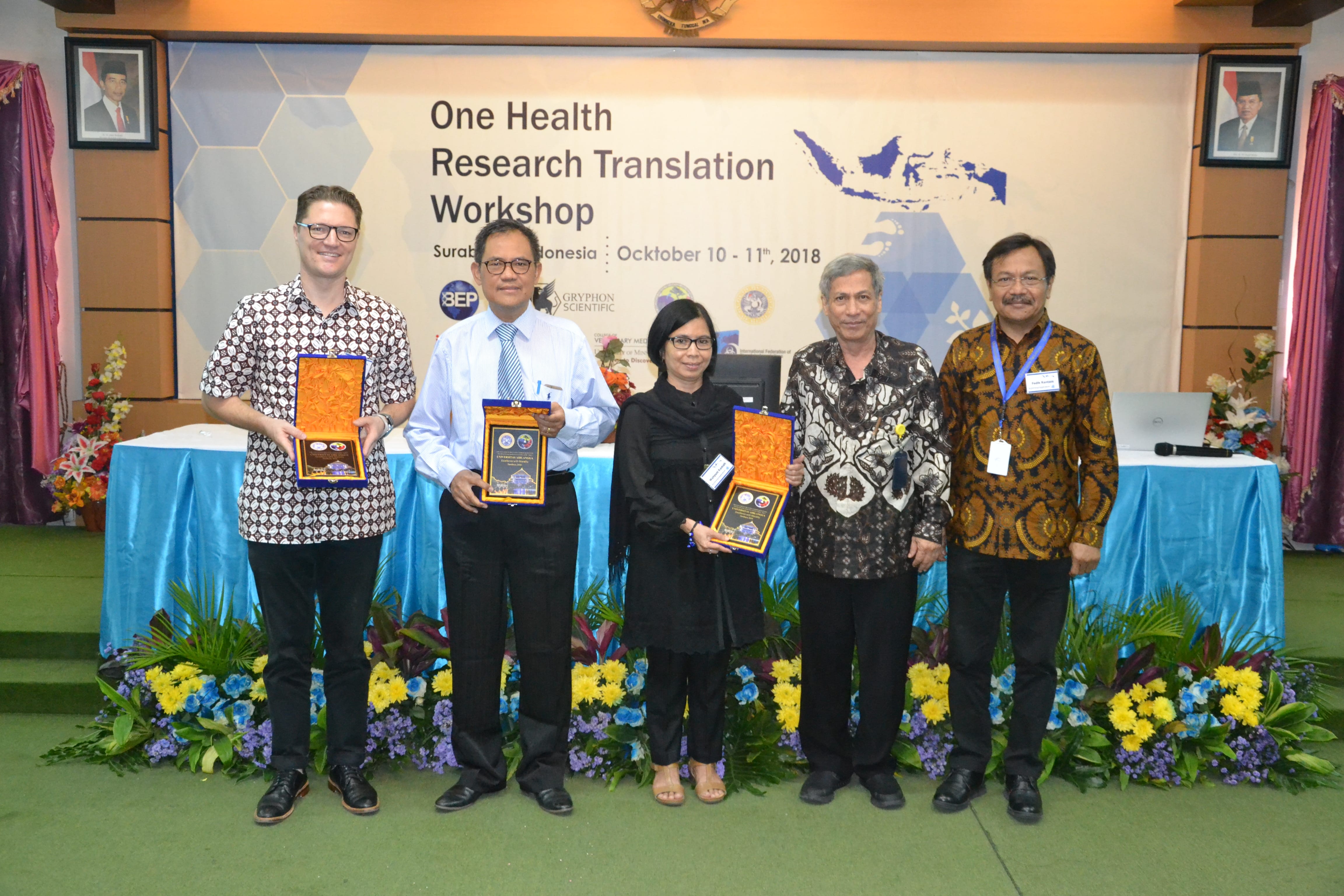UNAIR NEWS – Anthrax and avian influenza (AI) as zoonoses are still problems in Indonesia and they require serious attention. Zoonosis is a field of disease caused by infectious organisms such as viruses, bacteria and parasites that can be transmitted from animals to humans, and vice versa.
Improvement of their prevention, detection and handling by institutions related to zoonotic diseases is needed, especially regarding the integration and joint efforts between researchers and the government in dealing with the problems that arise in society.
As part of this effort, Universitas Airlangga through Airlangga Disease Prevention and Research Center (ADPRC) held One Health Research Translation Workshop on Wednesday, October 10 until Thursday, October 11 in Tandjung Adiwinata Hall, Faculty of Veterinary Medicine (FKH) UNAIR. The workshop was focused on identifying opportunities to apply research to zoonotic disease control policies.
According to the Head of the Committee Prof. Dr. Fendik Abdul Rantam, DVM., The results of workshop are expected to be applicable to institutions and all participants as some of them came from government agencies.
The workshop, continued Prof. Fendik, was a collaboration between ADPRC and Indonesia One Health University Network (Indohun) since ADPRC is a One Health Collaboration Center (OHCC). It was also supported by Gryphon Scientific; College of Veterinary Medicine, University of Minnesota; BEP, United States Biosecurity Engagement Program; and the International Federation of Biosafety Associations (IFBA).
“This workshop focuses on controlling anthrax and avian influenza. As both diseases are still a problem that we face, “he said.
Anthrax and Avian Influenza (AI)
Prof. Fendik said that anthrax in Indonesia was long endemic, especially since cases emerged in Purwokerto, Gorontalo and Central Java. Anthrax, he continued, is a disease that attacks cattle, but can spread to humans.
Germs in anthrax are very difficult to eradicate as they form spores, which are one or several cells wrapped in a protective layer or sphere. Over time, the spores can open and attack humans.
“Germs (bacteria, ed) take refuge in the spore,” he said.
“Up to 16 years (spores, ed). In pigs in Papua, it just emerged,” he added.
According to Prof. Fendik, now there are differences related to policies that influence the spread of the disease. The policy has a direct effect does not mean to have little value.
However, in other sectors, the potential for disease transmission can be high. For example, a matter of market or economic policy especially about the movement, buying and selling, cattle across regions.
“That (cow trading) is difficult to control. The regulation and trade is complicated, “he said. “When one is closed, the trading will not run. On the other hand, the disease will spread, “he added.
Avian Influenza (AI) is transmitted through the air, also through direct contact. Therefore, AI is a strategic disease that has a large economic impact including for state security.
“If we are not free from it (zoonotic disease, how do people want to come here (Indonesia),” he said.
Therefore, said Prof. Fendik, it is important to approach the handling through research. Furthermore, the research is used for policies. Basically, according to him, between policy and research, none preceeds each other. Because, both are very influential.
“The communication should be balanced, two-way. Not one. So that we can solve the problems, “he said.
“Research information is used for policy making. Policy also determines how research must be done, “he added.
Prof. Fendik continued, if there is no two-way communication, a comprehensive strategy is needed. It becomes very important that the goals or results can be achieved.
Meanwhile, Vice Rector I UNAIR Prof. Djoko Santoso dr., Ph.D., Sp. PD. K-GH. FINASIM appreciated the workshop organization. The presence of UNAIR as part of dedication must be felt, both nationally and internationally, especially through research activities and research on cases that arise in the community.
“Education and research are parts that cannot be separated,” he said.
“This workshop is very important as a medium for discussion of the latest innovations. Precisely to shape people’s lifestyle well. Because, lifestyle is strongly influenced by efforts to control adverse research findings, “he added. (*)
Author: Feri Fenoria





